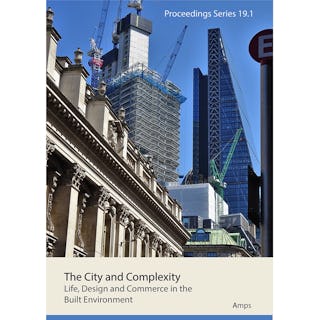The City and Complexity
R. Lastman (ed.), AMPS Proceedings Series 19.1

Life, Design and Commerce in the Built Environment
2020 marked the 50th anniversary of Jane Jacobs’ The Economy of Cities. It came a decade after her seminal work, The Death and Life of Great American Cities, and heralded a new age in thinking about the city. The city would no longer be a question of design and planning in isolation. From the early 1970s onwards, it would be seen as a complex interdisciplinary phenomenon.
The first years of the 1970s saw the introduction of a whole series of notions that would mutually inform our reading of the metropolis: social justice and the city, sustainability, defensible space, and urban centers as sites of public health. It saw the emergence of concepts such as the global city, urban economics, the post-industrial society and the cultural city. From art, design and cultural perspectives, post-modernism would critique the whole modernist project.
Five decades after complexity theory was first applied to our reading of the city, this conference and its publications revisit its consequences. They reconsider the city as an adaptive, self-organizing and unpredictable system of interconnecting interventions, forces and perspectives. They ask how these competing and mutually reinforcing factors came into play and how they operate today. They question how the city has been, and continues to be, informed by the practices of multiple disciplines.
Both the conference and this publication brought together a diverse set of theorists and practitioners to examine these questions from a range of discipline perspectives including urban design, architecture, sustainability, housing, public health and sociology. The result is a complex and fascinating journey through ‘the city’ defined as a complex, integrated phenomenon, both physical in its form and social and environmental in its impacts.
RVTR’s (Thün and Velikov) contribution unpacks questions of urban access and proposes methods, processes and tools that enable a rethinking of urban social infrastructures via our proposal for the Multi Modal Access Hubs project. The work utilizes the frameworks of complexity to propose interventions that themselves operate through the logics of complexity – reworking existing instruments, actors and agents operating within the city towards a constellation of lightweight technologically-enabled nodes that might comprise new models for social infrastructures.